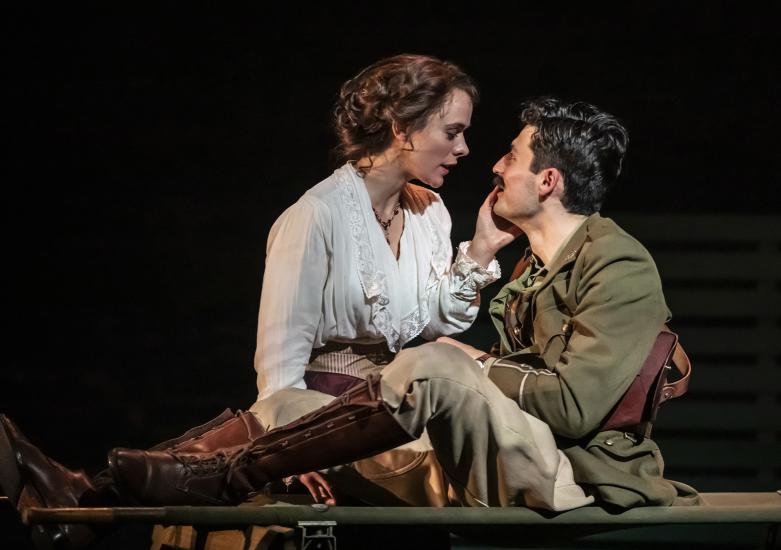Cambridge Arts Theatre, Cambridge – until Saturday 28th September 2024
Reviewed by Steph Lott
4****
Successfully adapting a novel into a play requires balancing fidelity to the source material with the unique strengths and limitations of the stage. This must involve making tricky creative decisions. I haven’t read Sebastian Faulks’ novel but from what I can understand, this brand-new adaption at the Cambridge Arts Theatre, written for the stage by Rachel Wagstaff, has some key differences. This doesn’t mean however that it isn’t a very successful piece of theatre that poignantly conjures up a time of love, loss and war.
From the moment the curtain rose, the audience was transported a very different world; from early 20th century France and then to the harrowing trenches of World War I. This was made possible by the versatile set, ingeniously designed by Richard Kent, seamlessly shifting between pre-war France and the brutal reality of the Western Front. The clever use of multi-level staging and minimalist props allowed for smooth transitions, enhancing the narrative flow without interruption.
The production was further elevated by Sophie Cotton’s evocative music. The haunting sounds and melodies perfectly complemented the on-stage action, enhancing the emotional impact of key scenes without ever overpowering the performances. The use of period-appropriate songs added authenticity to the production, while the original compositions beautifully underscored the themes of love, loss, and the futility of war. James Findlay’s vocal performance in the role of Brennan was magnificent and the singing of the whole cast towards the end of the play was beautiful and moved me to tears. I’m sure I was not alone.
James Esler delivered a captivating performance as Stephen Wraysford, the young Englishman whose life is forever changed by love and war. Esler’s portrayal was nuanced, effectively conveying Stephen’s transformation from a passionate young man to a bitter hardened soldier. Given that this was his first professional stage role, it was extraordinary. There was palpable chemistry with Charlie Russell, who played Isabelle Azaire. Her performance was delicate and fragile, depicting a woman trapped and on the edge. However, for me, one of the problems in bringing their story to the stage, was that the development of that story was somewhat rushed. This is one of the challenges of bringing a novel to the stage where time is tight.
Max Bowden gave a remarkable portrayal of Jack Firebrace. Bowden brought a perfect blend of humour and pathos to his portrayal of this character. Raif Clarke’s performance as Tipper was also superb and the storyline of those at the front line under the tunnels in a terrible war they don’t understand was performed brilliantly.
The whole cast deserves high praise for their ability to portray multiple characters convincingly. This added depth to the narrative and highlighted the interconnectedness of the various storylines. The seamless transitions between roles and scenes were a testament to the actors’ skills and Whatley’s direction.
Birdsong at The Cambridge Arts Theatre is a triumph of storytelling and stagecraft. It captures both the sweeping historical narrative and the intimate personal stories at its heart. For anyone who appreciates thoughtful, emotionally resonant theatre, this production of Birdsong is not to be missed. It’s a testament to the enduring relevance of Faulks’ story and the immense talent of all involved in bringing it to the stage.

